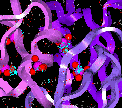 Molecular Dynamics -
Background
Molecular Dynamics -
Background Molecular Dynamics -
Background
Molecular Dynamics -
BackgroundDuring dynamics simulations, a system undergoes conformational and momentum changes so that different parts of the phase space accessible to the molecules can be explored. The conformational search capability of dynamics is one of its most important uses.
By providing several mechanisms for controlling the temperature and pressure of simulated systems, molecular dynamics also allows you to generate statistical ensembles from which various energetic, thermodynamic, structural, and dynamical properties can be calculated.
The study of dynamic motions of molecules is of great interest to chemists and biochemists. Although modern crystallography has provided a window into the static structure of molecules both small and large, the thought of intermolecular collisions and conformational variation is always present. After all, binding of substrates by proteins, folding of proteins and peptides into unique shapes, and chemical reactions themselves would be inconceivable without the concept of molecular motion.
Other approaches to simulating molecular motion and generating conformational searches exist. For example, a dynamics trajectory can be constructed from a set of normal modes to represent the vibrations of a molecule. While this is a fast method, it is restricted to harmonic motion about a single minimum. One approach to doing conformational searches is the Monte Carlo method. While this method can sample conformational space so as to produce meaningful statistical ensembles, it does not provide dynamical information on the system, since particles of the system are simply moved randomly according to some statistical rules.
 Main
access page
Main
access page  Theory/Methodology access.
Theory/Methodology access.
 Dynamics access
Dynamics access
 Integration Algorithms
Integration Algorithms
Copyright Biosym/MSI